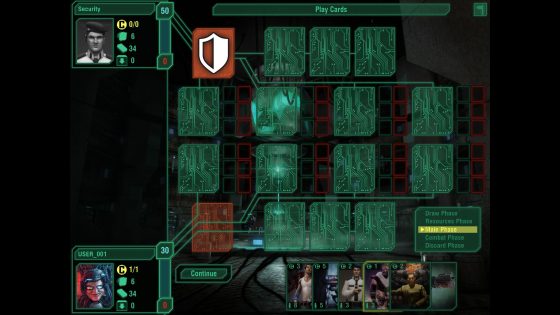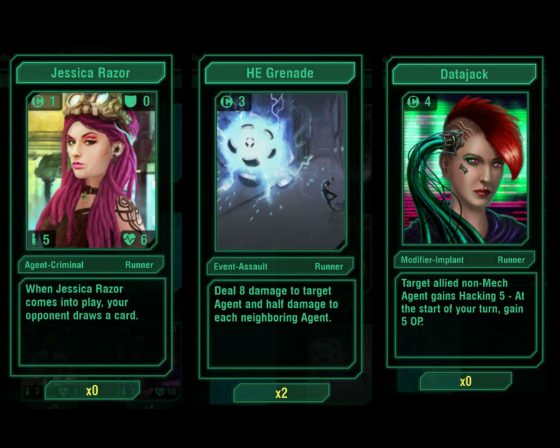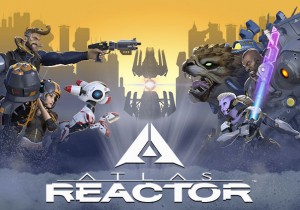Successfully passing through Steam’s Green Light gauntlet, System Crash is a single-player CCG with a story campaign that takes place in the cyberpunk neo-future city of San Angeles. You, as the player, assume the role of a capable hacker conspiring with other characters as you all strive to undermine and bring down powerful and corrupt mega-corporations. Each match in which you emerge as the victor progresses the narrative branches of both the main quests and side quests, and also has the potential of adding a new card to your library and/or a few extra credits to add to your cyberpiggy bank.
Welcome to San Angeles
It is through the dialogues in between matches that the world of System Crash develops. The game wears its inspiration on its sleeve, some of the characters even donning familiar outfits seen in the movies. The soundtrack is future-fantastic and evocative.
The story and characters don’t necessarily reinvent the cyberpunk wheel but what is worthwhile is that nearly all of the characters and items in which you read about during the dialogs also have their own respective playable cards. The attributes of these cards are designed to befit the attributes of these components of the story. This approach adds some diversity to System Crash’s overall available card library, which I will give more detail later on.
![]()
The driving force behind the setup of each match are the branching objectives of the campaign. New points of opportunities will pop over San Angeles as you complete missions, new and familiar characters sanctioning your l33t hacking skills to further the overall goal of toppling those huge corporations. You will click through dialog choices, of which, at least from my experience, feels like there is little divergence in story or alignment based on how you respond; the end result always seems to be the new objective points revealing themselves on the map.
A strong point in System Crash’s overall design is that it doesn’t bog itself down in presenting the story; it remembers, thank the neon mohawk gods, that it is a card game. The dialog stays light and the characters memorable so that story objective/match selection is quick and effortless. System Crash wants to beckon you deeper into the seedy avenues of neo-future San Angeles, but it wants to do it through its card game.
C:\User\DeckNameCypher\Jack_in.exe

The card game itself is simple in setup and works in the traditional IgoUgo sequence. Each card has a credit cost. Matches begin with each player at 1cr, which increases by one at the beginning of the player’s turn. In addition to this, the orange card slot is a match modifier, which varies and is typically dictated by the narrative setting of the objective.
There are four slots in the center of the board to place agent cards, who are the primary damage dealers. Each agent faces-off against the agent who oppose it until one of the cards runs out of health and is then removed from the board. If the opposing slot is empty, the attacking agent collects Operation Points based on its attack value.
Operation Points (OP) are your bread and butter. They are what you need to amass in order to win the match. The required total of OP for victory varies from match to match, though levels out eventually at 50.
Agents come in different flavors and are characterised by their role in the story. Mecs, for example, is a class of agent that have decent attack but tremendous armor health and armor. MetroSec cops are inherently unimpressive, but are given a buff based on how many other Mec agents are in play. Assassins cannot one-shot mecs, but can make chop suey of anyone else. Hackers generate OP at the beginning of your turn, while other agents reduce the OP collection of your opponents. Etc. etc.
Behind the row of agents on the board are three slots available for tactic cards. Tactic cards may buff your agents in varying ways or help with card draw or generate OP at the beginning of your turn. Along with these cards, there are event cards and other individual modifier cards that can assigned to de/buff individual agents.
Similar to Agent cards, each of the cards described above belong to a classification and sub-classification.

Synergy is very possible – and necessary, as sometimes a new deck must be built to counter a specific and rather challenging objective. For example, if facing a pack of aggro’d Neonmonger gang members (again, this is why there is value in reading the well-written dialogs!) it may be ideal to stock up on mecs to bear the brunt and let your tactic cards do the scoring for you.
Which side of the console are you?
The variety of classifications is a bit shallow. As it stands now there are a few classifications that just do not have sufficient representation to build a deck around. But the dis/favorability seen in this is lack of granularity is truly in the eye of the beholder. I, for one, find it to be much more manageable, not only in deck-building but in card acquisition as well. If anything, I would like to see existing classifications added upon before new ones are introduced.
System Crash adheres to the Living Card game model – meaning, there are no microtransactions. No booster packs. Every single card is available for purchase or sale from the get-go through the San Angeles’s black market… for a price, of course. So, if your random card winnings still don’t make the cut, if they aren’t giving you the edge against the AI, take your hard-earned coinage to the dark places of the black market and see how best to fill out your card library…
… Because the AI will hurl a storm of badass cards at you regardless of what is in your deck. In the early objectives the AI has a relative handicap in required OP but it has a maddening advantage in card selection. And yet, it uses these cards competently enough. One of the very first observations I made about System Crash is how well-coded the AI is. It will sometimes make questionable moves, and quite often needlessly empties its hand, but for the most part, it is a sound opponent in jockeying for OP. I would like to lob a small gripe towards the game’s absence of an in-match battlelog.
Bringing a wrecking ball to a haxx0r fight
The card attributes themselves are also rather heavy-handed, which works both for and against the game…
Indeed. These suckers hit and tank hard. Even some 1cr, opening move cards feel obscenely unbalanced. Whatever the credit cost of cards, this wonky feeling then ripples outwards, making it therefore difficult to craft intricate, granular decks.
Conversely, playing with ham-fisted cards is exactly what makes playing System Crash so tense and exciting. The AI could enact a devastating wipe to your side of the board. However, you have access to the exact same armory of cards and can set yourself up to repay the offense, and then some, all within perhaps a single turn or two. Or there is always the enraging possibility that you may never be able to recover. There is a modicum of control that must be set aside when booting up the game.
System Crash may not be delicate in its gameplay, but it still requires thoughtful and deliberate placement. Within two or three turns from the onset each turn played feels monumental. It is all about cutting your losses and not being afraid to take a punch or two or fifteen.
True to the setting of the game, the matches are bombastic; the fighting is dirty and maybe just a little bit rash. With a single card placement your mood can swing from desperation to adrenaline-fueled elation.
System Crash takes you to a grim future where you may or may not be apart of the solution. San Angeles is bursting with opportunities to test out your resolve in digital guerrilla warfare. The deck-building may not be deep enough to satiate some players, but for others, like myself, it is the perfect start. I can only hope that the future of the game may not be so grim as the city in which it takes place.
System Crash is available today on Steam.
